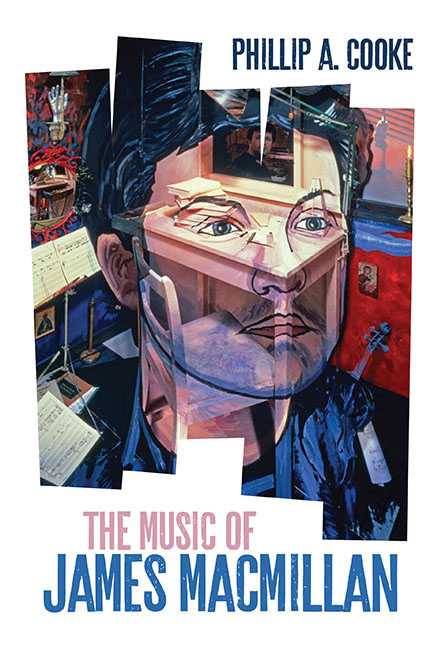Book contents
- Frontmatter
- Contents
- List of Plates
- List of Tables
- List of Music Examples
- Foreword
- Prologue
- Acknowledgements
- Permissions
- 1 The Keening – Cumnock, Edinburgh and Durham
- 2 The Tryst – Glasgow and the Road to Isobel Gowdie
- 3 Scots Songs – The Confession of Isobel Gowdie, Tuireadh and Veni, Veni, Emmanuel
- 4 A Different World – Visitatio Sepulchri, Seven Last Words from the Cross and Inés de Castro
- 5 Changed – Triduum and Quickening
- 6 Raising Sparks – ‘Scotland's Shame’, Politics and A Scotch Bestiary
- 7 A New Song – Mass and MacMillan 's Choral Renaissance
- 8 After Virtue – Symphony No. 3, The Sacrifice and the St John Passion
- 9 Serenity – Violin Concerto, Clemency and the St Luke Passion
- 10 Tu es Petrus – Bellahouston Park and the Return to Cumnock
- List of Works and Recordings
- Bibliography
- Index of Works by James MacMillan
- General Index
5 - Changed – Triduum and Quickening
Published online by Cambridge University Press: 31 August 2019
- Frontmatter
- Contents
- List of Plates
- List of Tables
- List of Music Examples
- Foreword
- Prologue
- Acknowledgements
- Permissions
- 1 The Keening – Cumnock, Edinburgh and Durham
- 2 The Tryst – Glasgow and the Road to Isobel Gowdie
- 3 Scots Songs – The Confession of Isobel Gowdie, Tuireadh and Veni, Veni, Emmanuel
- 4 A Different World – Visitatio Sepulchri, Seven Last Words from the Cross and Inés de Castro
- 5 Changed – Triduum and Quickening
- 6 Raising Sparks – ‘Scotland's Shame’, Politics and A Scotch Bestiary
- 7 A New Song – Mass and MacMillan 's Choral Renaissance
- 8 After Virtue – Symphony No. 3, The Sacrifice and the St John Passion
- 9 Serenity – Violin Concerto, Clemency and the St Luke Passion
- 10 Tu es Petrus – Bellahouston Park and the Return to Cumnock
- List of Works and Recordings
- Bibliography
- Index of Works by James MacMillan
- General Index
Summary
If the years from The Confession of Isobel Gowdie to Inés de Castro were MacMillan's first period of sustained success, one that announced him firmly to the country's musical consciousness, then the years from 1996 to 2000 were years of consolidation: a steady building on what he had achieved and a continued affirmation of all that had made him successful to that point. They were years of plenty, with a substantial increase in the amount of works produced, the quality of performers that the composer was working with, and exposure and dissemination of his work to a larger and more diverse audience. The backbone of MacMillan's output from this period rests on orchestral pieces: a standalone concerto (Ninian, for clarinet, 1997), a string orchestra work (Í – A Meditation on Iona, 1996), a piece for chamber orchestra (Symphony No. 2, 1999) and the monumental orchestral triptych, Triduum (1996–97). It also saw an increase in chamber and instrumental works, and perhaps most importantly (for future developments), a marked increase in vocal and choral pieces, including the substantial song cycle Raising Sparks (1997) and culminating in the 50-minute oratorio Quickening for solo vocal quartet, choirs and orchestra in 1998.
It also saw the first major retrospective of MacMillan's work in England, with the ‘Raising Sparks’ festival at the South Bank in London running from 28 September to 26 October 1997. This featured many of MacMillan's key works from the past decade including Veni, Veni, Emmanuel and The Confession of Isobel Gowdie, the London premieres of pieces such as Búsqueda and The Berserking and, presented as its centrepiece, the first full performance of the entire Triduum including the world premiere of the third part, Symphony: ‘Vigil’, in the opening concert. 1997 also found MacMillan as the featured composer at the Bergen Festival in Norway and saw the 100th performance of Veni, Veni, Emmanuel, an incredible feat in British contemporary music for a work that had only been premiered five years earlier in 1992.
This increase in productivity was not without its side-effects as MacMillan recalled before ‘Raising Sparks’, suggesting his home life was suffering under the increased workload: ‘She's [MacMillan's wife, Lynne] been very concerned over the last year, because I haven't been sleeping well.
- Type
- Chapter
- Information
- The Music of James MacMillan , pp. 97 - 120Publisher: Boydell & BrewerPrint publication year: 2019



